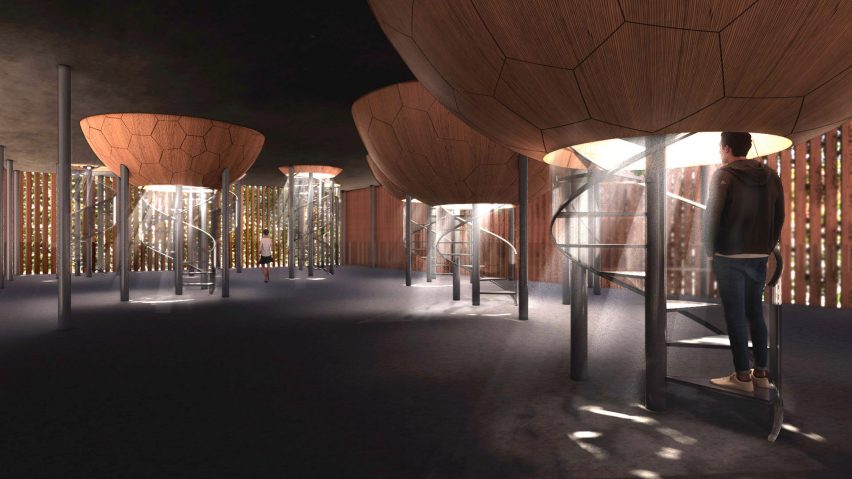
Ten sustainable architecture proposals by SUTD students
Sustainable Design for a Better World is the theme on which students from the Singapore University of Technology and Design based the projects in this school show, tackling issues like wildfire resilience, land scarcity and electronic waste.
The projects in this digital showcase were completed by those in the Architecture and Sustainable Design pillar, as part of the university's Master of Architecture programme.
Singapore University of Technology and Design (SUTD)
University: Singapore University of Technology and Design (SUTD)
Exhibition title: Sustainable Design for a Better World
Course: Master of Architecture
Pillar: Architecture and Sustainable Design
School statement:
"Singapore University of Technology and Design (SUTD) is pleased to present exemplary student work from the recent graduating class of December, 2020. These Master of Architecture students, while enrolled in the Architecture and Sustainable Design program, have embarked upon investigative architectural projects that address salient needs of multiple levels of societies in serious need of shelter, stability and architectural solutions. Concerned students represented in this sampling demonstrate the intellectual rigour and care which Singapore University of Technology and Design theoretical Master of Architecture projects embody.
"These 10 proposed architectural solutions strive to help humankind in Southeast Asia and across the globe. The thinking, planning, digital drawing and visionary solutions demonstrate how a Master of Architecture student's mind matures while mentored in the Architecture Sustainable Design program at SUTD" – Daniel Whittaker, senior lecturer.
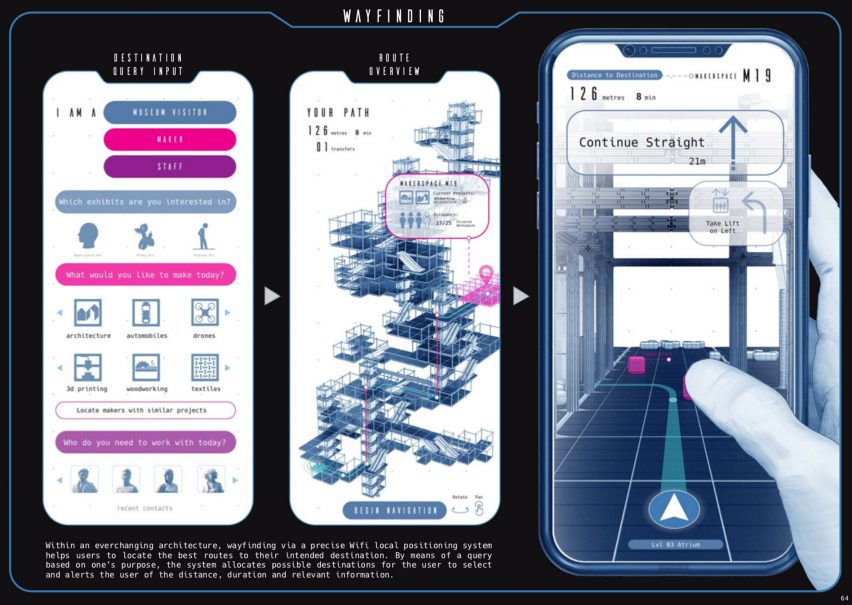
The Makers Museum by Chia Sheng Wei
The Makers Museum is an exploration in rethinking the typology of a museum as more than just a repository of artefacts showcased in gallery spaces, but also a space for the act of creation. Chia Sheng Wei harnessed the use of artificial intelligence, working in tandem with human stakeholders, to ensure that this future museum is a product of: a) high-intelligence generative processes, b) collective decisions and c) specialist interventions. This forward-looking project’s intention is to feature the new museum’s architecture as the zeitgeist; the museum reconfigures itself over time to suit the needs and desires of the age, through a series of modular inter-connected components.
Student: Chia Sheng Wei
Award: DP Architects Design Excellence Award (Master’s)
Thesis advisor: Immanuel Koh
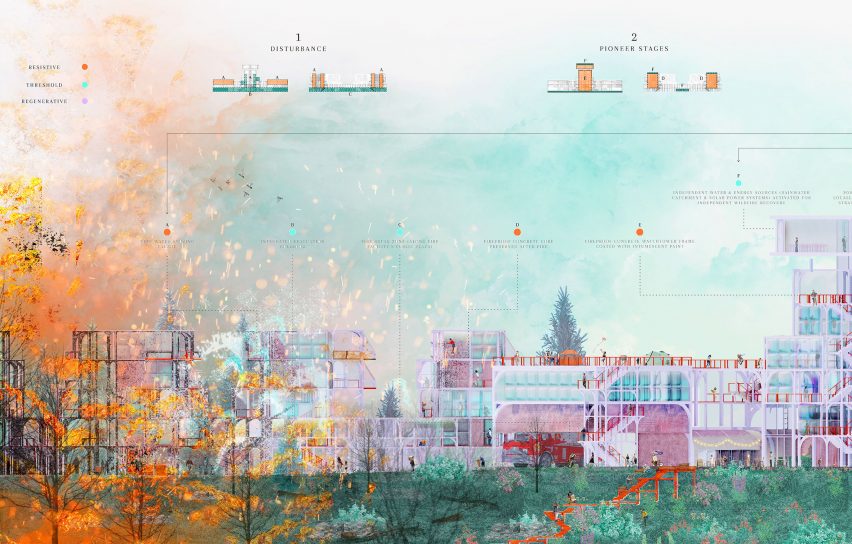
Rebuilding Paradise by Ng Wen Qi
As urban habitats and natural landscapes become increasingly intermixed, wildfires that are capable of devastating entire towns and communities have become commonplace in wildland-urban interface areas. Ng Wen Qi's thesis takes a critical relook at wildfire resilience by understanding the wildfire crisis in the Californian context, where the pursuit towards aggressively fortifying urban habitats has become modus operandi.
This thesis project deconstructs the adaptive features and time-specific mechanisms that make up the ecological model of fire-adapted ecosystems. As a result, a new prototype for its urban-architectural equivalent is envisioned. This prototype takes on the form of a strategically vulnerable, regenerative suburban community situated in Paradise, a town left crippled by one of California's most destructive fires. This thesis project is a rebuttal against the typically loss-adverse, hyper-defensive narrative for resilience, proposing instead an approach of targeted loss and architectural and ecological regeneration.
Student: Ng Wen Qi
Award: Master of Architecture, winner of two Thesis Awards – Representation and Social Innovation
Thesis advisor: Peter Ortner
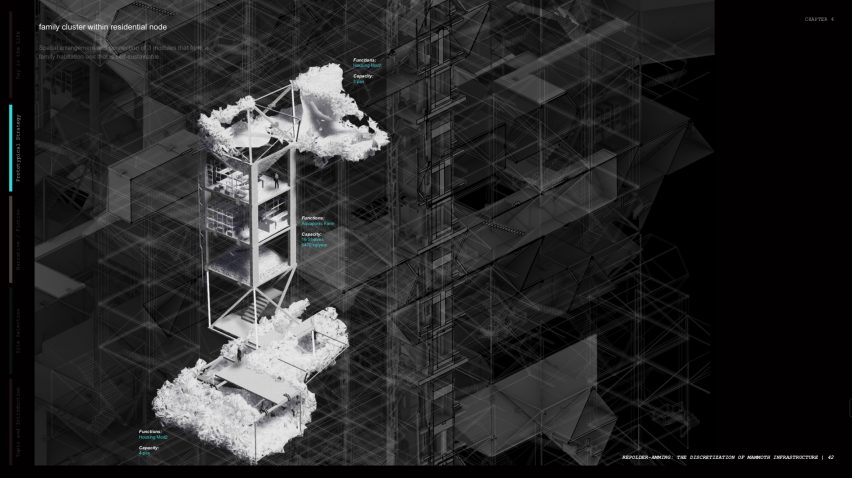
Repoldergramming by Poon Weng Shern
Global population growth and its concomitant infrastructure networks grow, in tandem, polders as reactions to climate change and polders as state establishment. The lack of critique towards this infrastructure arises from the skewed perception of these as purely "technical" constructs of engineering rather than messy assemblages or cyborg complexes. Site Testbed, Hai Phong City, the port city of Hanoi, in Vietnam, served as the prime site of this thesis investigation. The infrastructure component of the breakwater is re-investigated in terms of how new aquaculture-centred activities can enable greater food production and efficient harvesting to feed an ever-growing population demanding greater nutritional intake to sustain such growth.
Student: Poon Weng Shern
Award: Master of Architecture Thesis Award – Research
Thesis advisor: Eva Castro
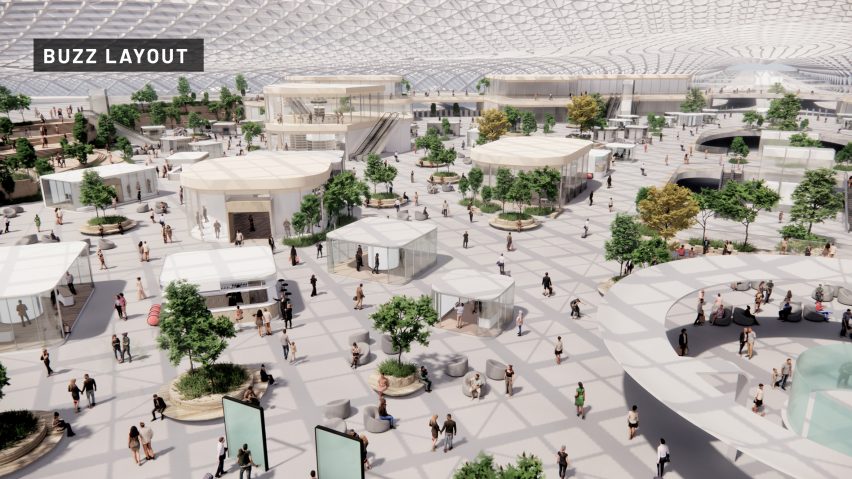
Aviation 2050 by Tan Gee Yang
The aviation industry has proven to be largely resilient to external shocks since the 2000s and the demand of air travel has been doubling every 15 years. However, the onset of the COVID-19 pandemic in 2020 has compelled many governments to implement lockdowns; this halt to travel has shed light on the fragility of airport terminals on two scales: the circulation of passengers and the process that govern the way people move in the airport.
This thesis posits that a more adaptive circulation framework within Singapore's Changi airport is a means to building anti-fragility. It aims to develop a framework for a more adaptive and flexible circulation system, allowing airports to handle varying undefined future scenarios. At the same time, this would also allow for the more efficient processing of passengers, providing a more intuitive way-finding experience. This thesis hence imagines a future adaptive anti-fragile airport that can embrace change, dynamically absorbing and rebalancing itself to the unforeseen demands ahead.
Student: Tan Gee Yang
Award: Master of Architecture Thesis Award – Computation
Thesis advisor: Sam Joyce
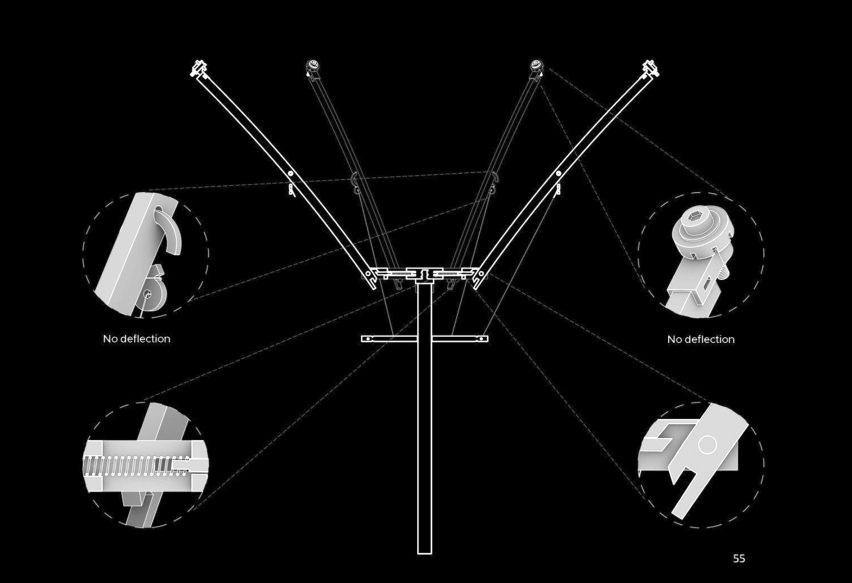
Deployable Enclosure by Tan Zhi Wei
Architecture constantly seeks to find ways to respond and adapt to changing situations. Unequal and impromptu influxes of transient populations, due to economic and humanitarian migrations, results in a worsening of housing issues in cities and countries that are already face land scarcity.
Tan Zhi Wei's thesis aims to find an appropriate architectural solution to the problems of population growth and habitation issues that arise — through the use of transportable, deployable and lightweight structures. Such structures were conventionally thought of as temporary structures meant to be quickly erected for short periods, however advances in technology and building methods could allow for such structures to become habitable living spaces to alleviate problems caused by ever increasing population numbers.
Student: Tan Zhi Wei
Award: Master of Architecture Thesis Award – Fabrication
Thesis advisor: Kenneth Tracy

Urban Tranquillity by Pang Yun Jie
This thesis proposes a sequence of spaces for tranquil experiences in high-density cities. There is a need for such restorative spaces because city dwellers have been found to have a greater likelihood of developing mood and anxiety disorders. While there are many architectural examples that provide calm spaces, they often do not address the noise pollution of the modern city. To enable mindfulness amid noise pollution, Pang Yun Jie’s thesis proposes a building that provides an experiential journey, offering a choreographed transition from a spectrum of city sounds, one sound source at a time.
Student: Pang Yun Jie
Award: Master of Architecture Thesis Award – Sustainability
Thesis advisor: Thomas Schroepfer
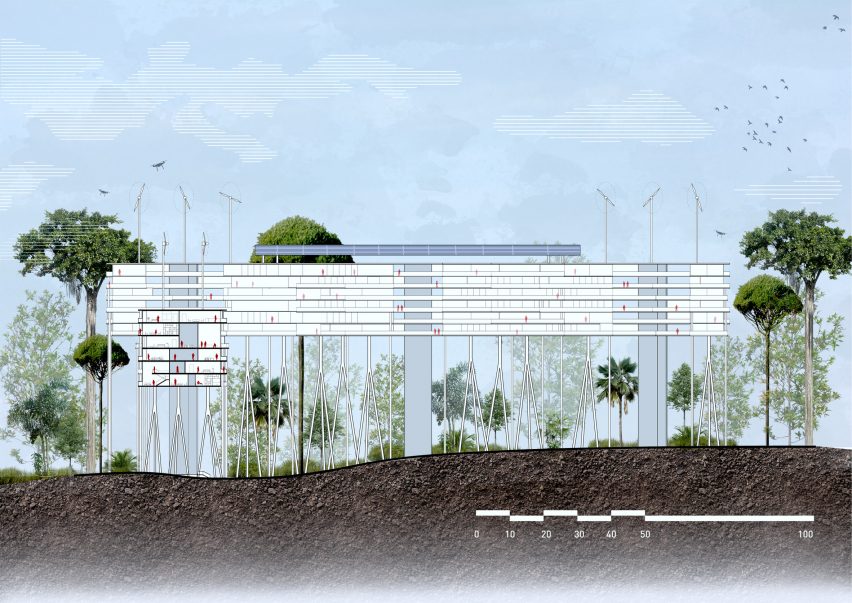
Moving Capitals by Michelle Gouw
Jakarta's sinking urban situation due to climate change and rising sea levels has prompted the official government to move its central government offices and capitol buildings to East Kalimantan. The building of the new capital might have significant environmental and social impacts on Borneo. Michelle Gouw's thesis proposes a new building typology for the new capital that aims to minimise the negative ecological impact of the development.
Gouw proposes a "hovering" compact urban fabric, with a minimal building footprint to allow for the ecosystem of Kalimantan to remain intact as much as possible. Referring to Lazar Khidekel proposals of 'aero city', elevating a city is one way to break the correlation between construction of the cities and destruction of nature. As such, Gouw's vision for the new capital aims to redefine sustainable urban architecture for Indonesia and beyond.
Student: Michelle Gouw
Award: A nomination for two awards: Sustainability and Social Innovation
Thesis advisor: Thomas Schroepfer
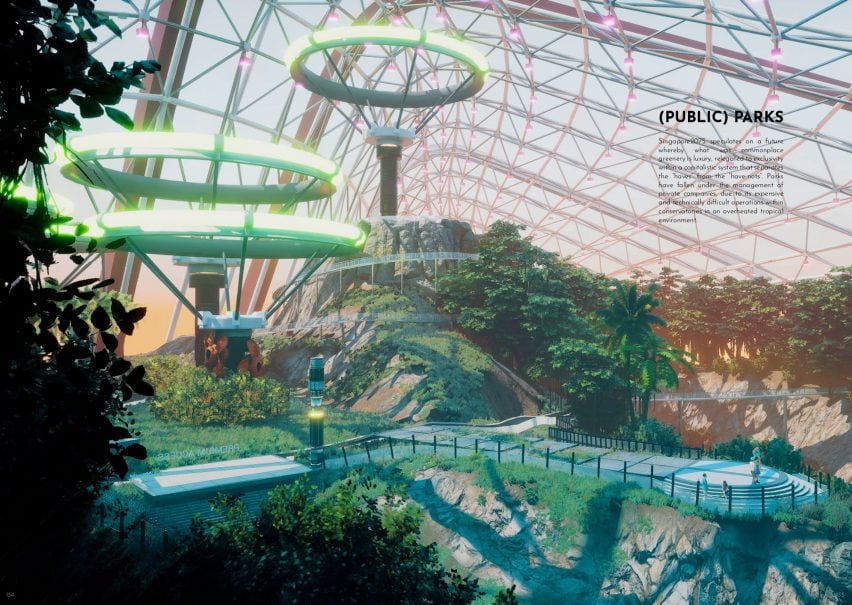
Singapore 2075 by Caleb See De Kai
This thesis seeks to speculate on the trend of unbridled technological implementation within our built environment, where the varied integration of and seemingly benevolent decisions made on technology in everyday lives may cumulate into an unstable and unsustainable future, without our realisation of the consequences unleashed. Three primary stakeholders are considered: the people, the government, and corporate entities. Within this framework, the relationships and dynamics are investigated. Caleb asks: "Who has the ultimate control within the next generation smart city, and how truly smart are people in an inherently top-down smart city?"
Through the use of fiction and world-building, a series made of three acts invites discussions on the Internet-of-Things of today, caricaturing and challenging established dogma. This theoretical narrative takes the position of the National Cyberspace Agency, in the 2070s. Its future goal is to shape Singapore to be a technologically advanced and compatible digital hub through investments in infrastructures of connectivity and collaboration, thereby aligning with Singapore's national agenda of being a neutral platform and smart nation.
Student: Caleb See De Kai
Award: A nomination for two awards: Research and Social Innovation
Thesis advisor: Eva Castro
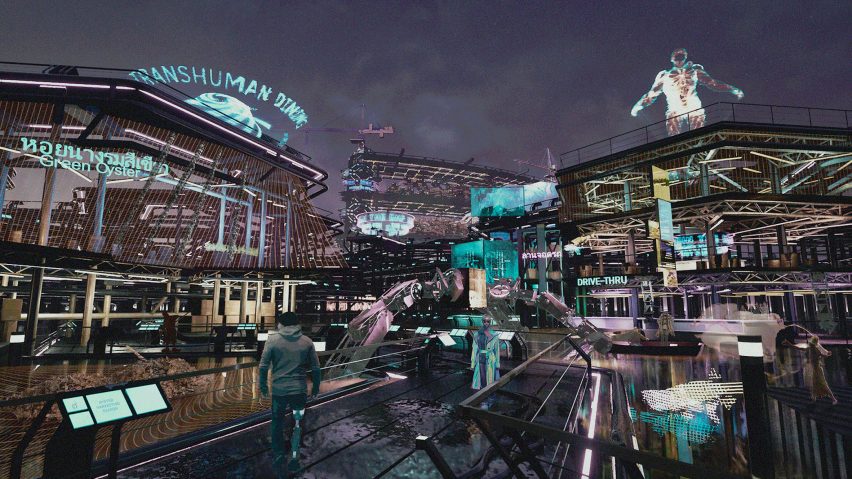
New Operaism by Ian Soon Wen
Ian Soon Wen's thesis asks the question, "What does an alternate future for the exploited workers in Southeast Asia's electronic waste industry look like?" New Operaism is a speculative fiction that envisions a new form of territorial life, one that seeks to inhabit the uninhabitable. Given the vulnerability of coastal waste infrastructures, the project attempts to transform a drowning landfill at the mercy of climate change into a thriving cyborg community.
Examining the starting and ending points of the global trans-boundary electronic waste flow, the vulnerable communities living in close proximity to the landfill begin to occupy their new aquatic territory by processing the landfill and trans-boundary electronic waste into building materials, aquaculture and energy systems, augmenting the natural and synthetic systems into a cyborg ecology. A trans-human society established from urgency, the exploited labourers project themselves into an alternate reality, one in which they gain full autonomy by harnessing the power of technology to move into a post-labour future.
Student: Ian Soon Wen
Award: A nomination for two awards: Research and Manufacturing
Thesis advisor: Eva Castro
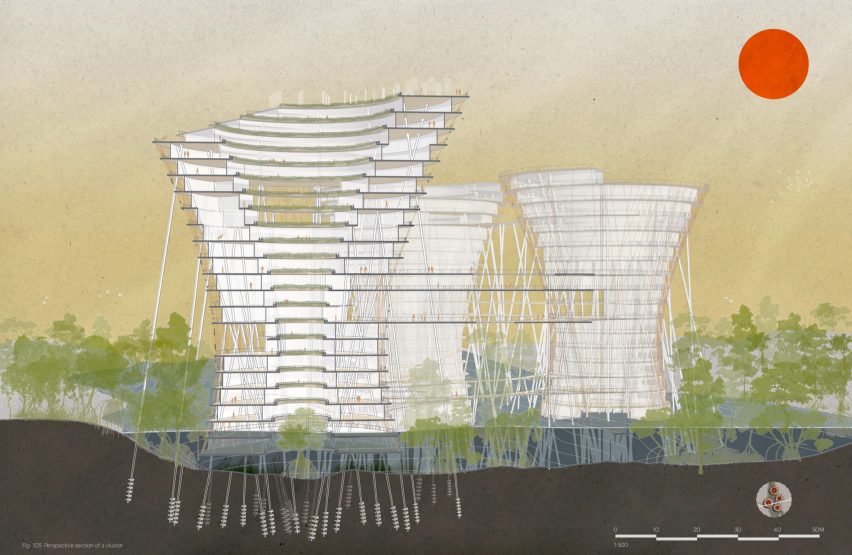
Urban Deltascapes by Tan Chiew Yu Audrey
Most of Singapore's coast is lined with seawalls. These 'hard' defensive structures significantly limit a more symbiotic relationship with the sea that can include ecological processes involving both terrestrial and marine environments. Recognising that climate change and the related rise of sea levels will impact Singapore, Audrey's thesis explores an alternative strategy for Singapore — as an urban environment that embraces its relationship to water.
The Keppel-Labrador-Bukit Chermin Planning Area presents an ideal testing ground. Situated along the coastline and adjacent to the ecologically-diverse Berlayer Creek, this thesis presents an alternative approach to new developments along this Southern Waterfront. Instead of conventional 'hard' defences, this reprogramming proposes a resilient coast through use of natural systems — to not only protect and restore ecologies, but to develop the city with these natural environments in mind. This project proposes an urban solution that mediates between land and water along the existing ecologically sensitive Berlayer Creek that features one of Singapore's largest remaining mangrove forests.
Student: Tan Chiew Yu Audrey
Award: A nomination for award: Sustainability
Thesis advisor: Thomas Schroepfer
Partnership content
This school show is a partnership between Dezeen and Singapore University of Technology and Design. Find out more about Dezeen partnership content here.